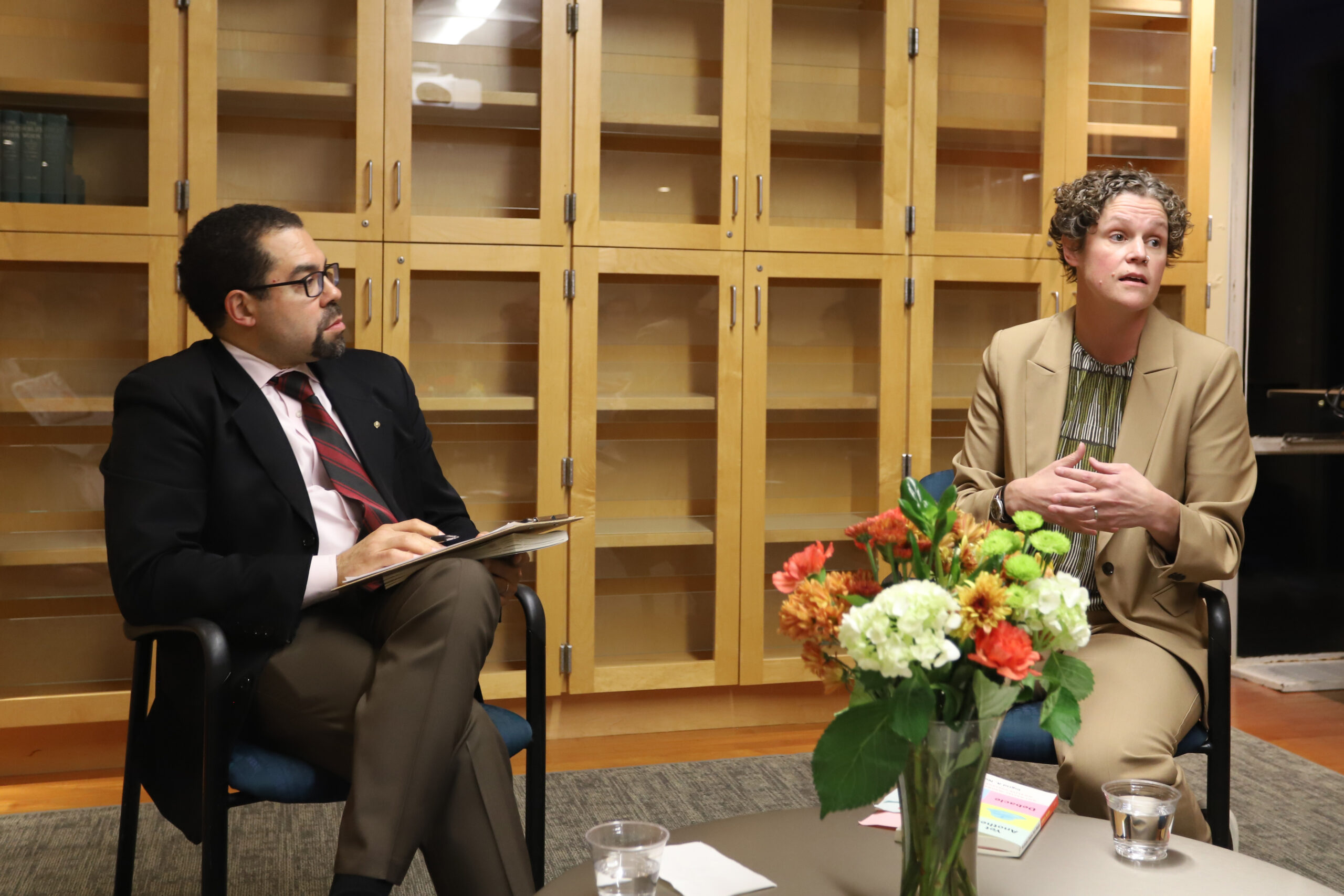Professor Nelson discusses the history of racially charged parties at Bowdoin and holding students accountable
November 14, 2025
 Kiran Elfenbein
Kiran ElfenbeinOn Thursday evening, Hawthorne-Longfellow Library (H-L) hosted a book talk to celebrate the release of Professor of Sociology Ingrid Nelson’s new book, “Yet Another Costume Party Debacle: Why Racial Ignorance Persists at Elite College Campuses.” Associate Professor of Africana Studies and History Brian Purnell joined Professor Nelson in the conversation, where they discussed Bowdoin’s history of racially charged parties and student accountability after each event.
Nelson’s book discusses three racially charged costume parties that happened on campus in 2014, 2015 and 2016. The book explains how the structure and policies of elite colleges like Bowdoin foster an ideal environment for these incidents to occur and for students to lack understanding of why their costumes are considered harmful.
The 2014 party, hosted by the men’s lacrosse team, was referred to as a “Cracksgiving” party and featured attendees dressed as Pilgrims and Native Americans. The 2015 party was hosted by the sailing team and involved students dressing in their perceptions of “gangster” costumes, which were racialized as Black costumes. In 2016, a group of students unaffiliated with a sports team hosted a birthday party for a friend, referring to it as “not not a fiesta,” where attendees wore sombreros and drank tequila.
After Nelson explained the circumstances surrounding each party, Nelson discussed why the students involved in each party differed in their reflections after the incidents.
Nelson noted that attendees did not experience significant change in their opinions after the 2014 “Cracksgiving” party, which garnered some media attention.
“The takeaway from that [party] is that 14 of the students who attended the party [did] get in trouble. The fallout, at least in students’ perceptions, is [that] the house shuts down, the students have to move out, the good parties end and some students end up quitting the lacrosse team. So there’s no real [change],” Nelson said.
In contrast, Nelson found that students who attended the 2015 “gangster” party were much more involved in constructive conversations afterward to learn from their actions.
“There [were] a lot of intentional conversations between the team and [the Black Student Union].… They learn, they institute these procedures for their team [and] they institute a formal apology so that this will never happen again,” Nelson said. “They sit in front of a [Bowdoin Student Government] meeting and listen to all of the other students telling them they did a terrible thing, and they educate themselves and they repent, essentially, is what happens there.”
While having an affinity group join these conversations was impactful for the sailing team, Nelson acknowledged that those conversations take a significant toll on the students of color who host them.
“The terminology that sociologists have come to use is racialized equity labor. Essentially, you have students of color doing free labor on behalf of the institution. In many of these cases, they are asked to do that by administrators,” Nelson said. “They are called in by deans who say, ‘Will you do this work?’ It’s not paid. It’s taking time out of their class schedules. It’s taking a huge amount of psychic energy, and they agree to do it because of the social contract of this place, but it is literally bleeding them dry.”
The 2016 “fiesta” party differed in that it was not hosted by one collective sports team, which Nelson found disincentivized students from coming together to address their harmful actions.
“These kids aren’t part of a team, so they’re not bonded to each other administratively or sort of psychically in the same way. They don’t have a coach who’s going to give them practice time to sit and write their apology. They don’t have the consequence of losing playing time or not getting to go to playoffs,” Nelson said.
Nelson found that students who attended each of these racially charged parties learned from their actions only if they were willing to do so. Nelson brought up the example of diversity training modules to explain this phenomenon.
“What do you take from [diversity training modules]? Research would say, not much, right?… That kind of stuff only works if people want to learn it, and some of them do. Some [party attendees] learned a lot, right? It’s a life-changing experience for them, literally. But most people didn’t learn anything at all,” Nelson said.
Annie Stent ’27, who attended the book talk, said she appreciated Nelson’s honesty regarding how little some of the party attendees learned.
“I liked the focus on, ‘You can’t send people and expect them to learn something if they don’t want to be there, and they’re not willing to learn.’ So, I feel like it was kind of bleak, like, ‘Well, what do you do then?’ But, still, at least some people are doing the work,” Stent said.
Anna Yeh ’27, who attended the talk with Stent, agreed with Stent’s sentiment.
“[Stent and I are] both on a team, and we do the diversity trainings. So when [Nelson] was talking about that, we’ve seen people not buy into them,” Yeh said.
To end the discussion, Nelson emphasized the impact that one-on-one interactions can have on students who are willing to learn.
“There are a number of examples in this book of people who were pretty entrenched on one point of view, who sit down and they’re like, ‘Oh, I’m so grateful to my friend because she talked me through it,’” Nelson said. “I do think that individuals have agency on a micro level, and that there’s a pretty powerful peer-to-peer education model that happens when other students are curious to learn.”

Comments
Before submitting a comment, please review our comment policy. Some key points from the policy: